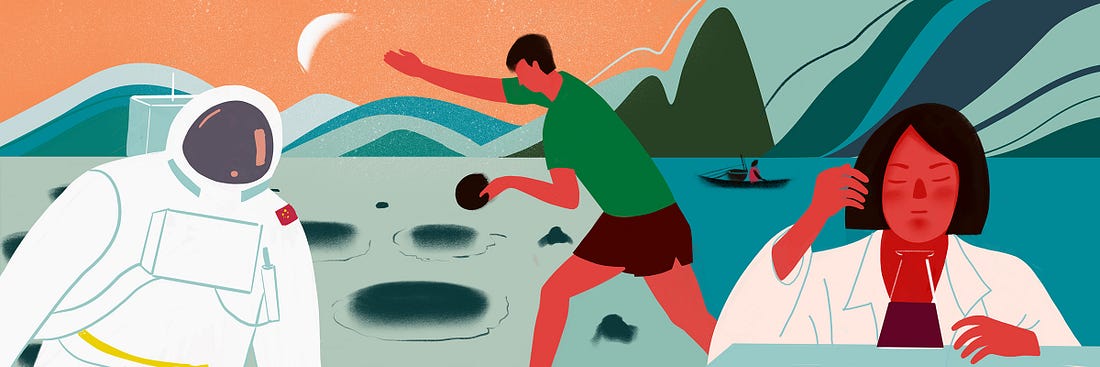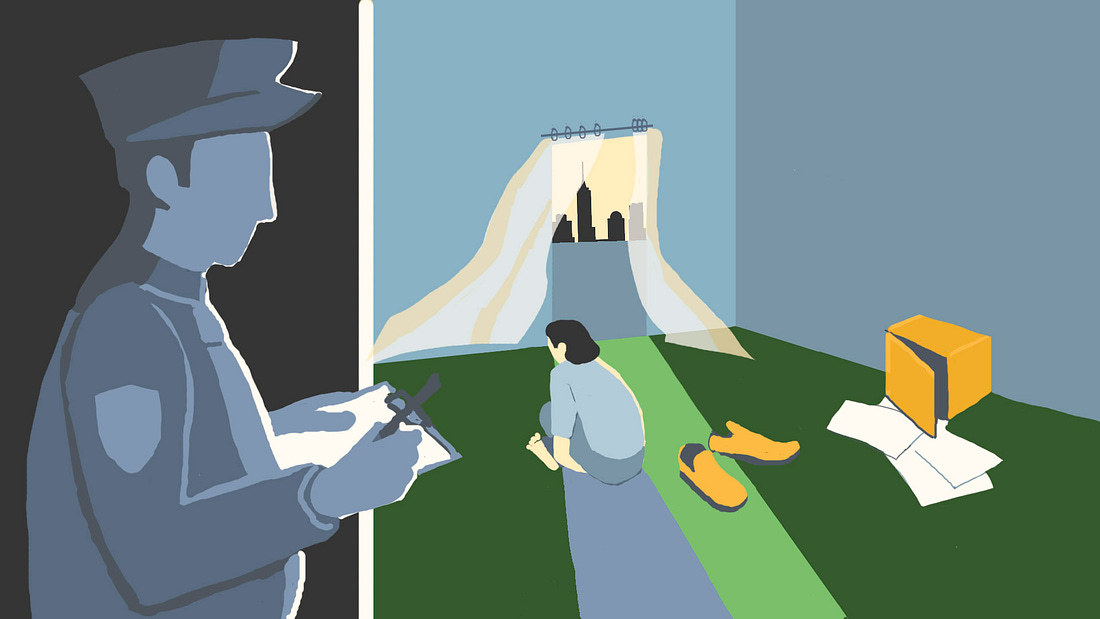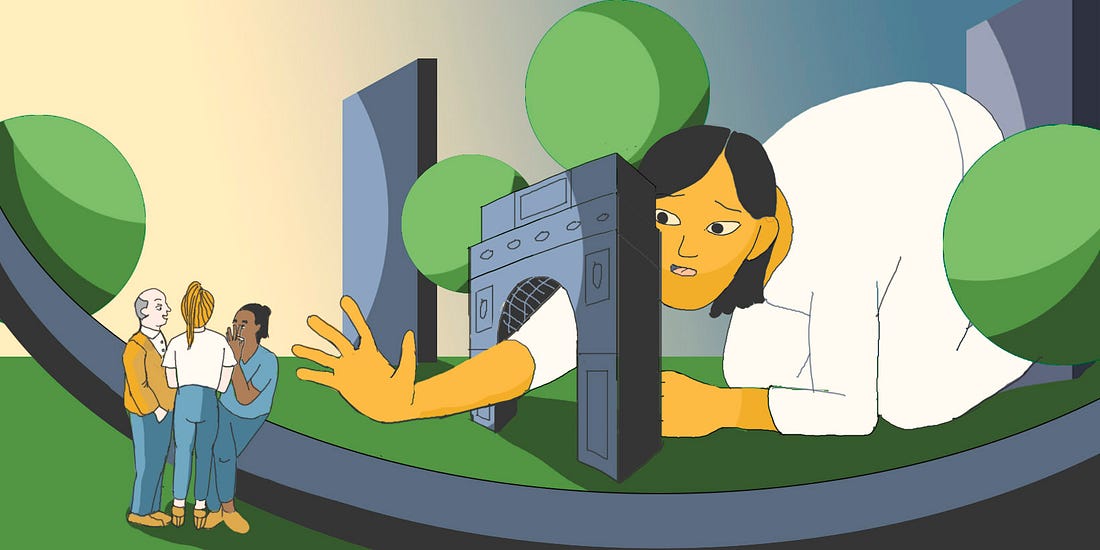
Welcome to Issue 3, featuring the moving first-person piece by talented Chinese writer Lux Chen we promised you last time, a selection of other must-read stories, and a brief update on what the team at Chinarrative has been up to in recent weeks—including mulling over what we should call ourselves in Chinese!
First up: New York-based Chen writes about how a housing scam led her to discover her tribe in the city. Such personal reflections by Chinese people—including those from the diaspora—form an important part of Chinarrative’s mission to bring “undiscovered” voices to a broader audience.
Achievable Goals: How The Great Gatsby Saved My Life
By Lux Chen
It was snowing that night in early January when I returned to my Queens apartment around 11 p.m. I opened the door to my small, windowless room on the sixth floor. It was completely empty.
I knew immediately my roommate and her partner had robbed me. Books, clothing, furniture, documents—all my earthly possessions were gone.
Devastated, I spent the entire next day filing a police report. After a day at the precinct, I was exhausted and numb, but I forced myself to attend a screenwriting class that I had previously signed up for, telling myself: Life must go on.
 Joyce Siu for Chinarrative.
Joyce Siu for Chinarrative.
In that class, the first thing we learned was that your characters need to have “achievable goals.” For instance, “earning respect from my parents” is not an achievable goal, but “convincing my parents to attend my gay wedding” is.
In the following days, I became obsessed with this idea. Crashing on a friend’s sofa, wearing clothes donated by a local church, looking out the window at the raging blizzard and missing my snow boots, I asked myself, repeatedly, what if everything ends here? What if the dark, empty, hostile room I had been living in signifies my whole wretched life, as it already did? Where could I find achievable goals in this valley of the shadow of … whatever?
Then suddenly, The Great Gatsby came to mind. It wasn’t just because Gatsby’s splendid mansion on Long Island was in sharp contrast to my own shabby, windowless room. It was also because I had just reread the novel shortly before disaster came my way. The novel awakened something so long hidden and dormant in my heart that I had almost forgotten its existence.
I had come to the city after barely surviving a physical and possibly mental breakdown. I’m never sure about the mental part because I couldn’t get any professional help at The University of Texas at Austin—my first stop in America—where I had come to study comparative literature. The university’s health center refused to let me see a counselor, basically telling me that they had no time for me unless I wanted to kill myself at that very moment.
I did not want to kill myself; I just craved a bigger world. I had come to America from China hoping to become a cosmopolitan writer. I wished to read the books, watch the movies, and meet the people whom I had no access to back in China—to be a world citizen, both in art and reality.
Soon I realized that the only way my program would offer me financial support was if I spent more time teaching Chinese to UT students rather than doing work for my own classes. That TA job would restrict my class schedule, pigeonhole me as a conduit for Chinese language and culture, and determine my field of study, my research topic—every part of my identity and my future.
I entered the program full of aspirations but left in despair.
By serendipity, in Austin I met two professors and a few friends from New York. The proud stories they told me about their hometown complemented the novels, movies, and lectures I had come across about New York City. I fantasized about New York as a world full of literary salons, cinematheques, cool cocktail parties, and beautiful creative people. It was the cosmopolitan world of my dreams.
So while all my friends became Chinese language instructors, married computer programmers, and lived happily ever after somewhere in Texas, I packed for the Big Apple and the cosmopolitan life.
For my first adventure in the city, I posed as a student-journalist doing a project on New York history so I could talk to strangers in Central Park and along Fifth Avenue.
In real life, however, I never got a job like that. The only publication willing to pay for my writing was a lifestyle magazine catering to affluent Chinese in New York. They were mainly interested in covering fancy restaurants and luxury stores.
Through all this, I stuck to my plan of looking for creative people and insisted on profiling artists and covering art events whenever I could. Most of my story pitches were rejected. When they were not, the articles I spent the most time on and cared the most about would appear on the last two pages of the magazine. But that didn’t matter, since my goal was to get to know the artists I interviewed.
It turned out that the only way for me to join the artists’ projects was to help translate their materials into Mandarin—often for free. That was the only value people saw in me. As time went by, this became the only value I saw in myself.
 Joyce Siu for Chinarrative.
Joyce Siu for Chinarrative.
My undiagnosed depression deepened day by day. When I read and wrote at the communal desks in the New York Public Library, I often had to rush into the bathroom to cry. In my darkest moments, I could not hold back my tears anymore and would just hide myself behind a book or a computer screen.
I also used to hide my tears in the solemnity of the church or the darkness of movie theaters—my two favorite places for public weeping.
At night, I kept having this dream in which I went back to school to finish my doctoral degree but could not find my classroom. Once, when I finally followed the crowd into a giant, round auditorium, what greeted me was a sparkling black coffin at the center of the podium, surrounded by candles, flowers, and a children’s choir. It was not a class, but a stranger’s funeral. Or was the funeral for me?
Ten years ago, I wished to read all the great books in the world and write one or two of my own.
Five years ago, I dreamed of exploring the world and meeting inspiring people.
Three years ago, I tried to write a love story between an immigrant woman wandering the city in search of an apartment and an equally rootless subway musician, but the love story turned into a ghost story, and I didn’t know how to write a ghost story if I myself were the ghost.
Last year, I moved into that horrible apartment, despite all the red flags, because I wanted desperately to have American roommates so I could practice English. The only English expression I learned was “solitary confinement.”
Rereading Gatsby brought everything back, because that was where all my dreams started. Now that I had lost all my earthly possessions, I suddenly realized that reading had been the most cherished memory in my life, and that all the great books would still be there to inspire me and keep me sane even if the whole world deserted me.
I had an epiphany: I decided to start from where I got lost.
I would reread all the literary masterpieces I had planned to read, or had read without understanding much, or pretended to have read. This became my first achievable goal; this was where I would search for my lost soul.
I started with Faulkner’s Light in August, since I needed light more than ever. Never had I expected that, in this novel about a young pregnant woman searching for her baby’s father in the racially segregated Deep South, I would find all these orphans and strangers and many endless journeys that mirrored my own.
It was early spring. Many friends participated in the Women’s March or the demonstration at New York’s John F. Kennedy International Airport against President Donald Trump’s travel ban. Watching them, I suddenly felt part of a larger humanity as I never had before, part of all these displaced people who are like the birds with nowhere to “fly after the last sky”—in the words of Palestinian poet Mahmoud Darwish—and who rely on the kindness of strangers.
That feeling echoed my reflection on Light in August. Suddenly, I realized I had found my community both in books and in real life; it was a community that embraced me and needed my voice. I found a group of Chinese feminists from the Women’s March on Facebook, joined their activities, and started to write for their new publication, “Women and Gender in China.”
With them, I have embarked on a new journey toward a different kind of cosmopolitan life. In this journey, I know I will never be alone but will always be part of the people ahead of me and around me, searching for home, for meaning, for the light.
Recent stories we liked:
In addition to this issue’s featured excerpt, we would also like to highlight the following outstanding Chinese-language story:
Xu Mengnan’s College Entrance Exam Flunk Plan It’s been a decade since Xu Mengnan deliberately failed China’s college entrance exam, in protest of what he considered the country’s flawed system of education. This story, which appeared in Chinese in Noon Story, recounts how Xu, a student from the countryside, began to question the effectiveness of China’s rigid education system after reading an essay on the topic by then-rebellious race car driver, author, and blogger Han Han.
Xu hoped his actions would spur educational reform. They didn’t. In a bid to garner media attention, Xu even tried to fake his own suicide. That didn’t work either. Soon his life entered a downward spiral, as he shuffled from one dead-end job to another while continuing to expound on his ideas through his blog. Xu married and fathered two children, but the couple later divorced. This is not the first story to recount Xu’s fall from grace. An earlier preachy piece from the Global Times focuses on how Xu, who at the time worked in a pig-hair processing plant, regretted not “playing by the rules” of society.
Xu’s story is a tragic one, highlighting the frustrations and costs of trying to buck “the system.” There’s a happy ending—of sorts: Xu decided to sit a version of the gaokao earlier this year. He was admitted to college, where he’ll study journalism.
As for Han Han? He’s gone from being a writer to acting as a public intellectual to owning his own film production company. Earlier this year, he wrote an article highlighting the fairness of the Chinese education system and lauding it for giving students from the countryside the chance to elevate their position in society.
And this from the not-so-distant past:
China’s Disappearing Delivery Workers It’s challenging being a delivery person anywhere in the world, but in Beijing, it’s arguably tougher. Chinese consumers’ sky-high expectations for prompt delivery of goods purchased online, increasingly stringent rules that govern everything from where warehouses can operate to where migrant workers can live, as well as mounting competition all pose a threat to the country’s once-booming courier industry.
A group of delivery workers stands in the back of a delivery truck. Source: ImagineChina.
In this article, published last winter in Meirirenwu, four workers share stories from their careers. One deliveryman named Chen Dong, who works for YTO Express, said the real source of exhaustion for him is the mental—not the physical—aspects of the job. He told reporters Yang Lu and Han Yi:
If you [the delivery person] misread a door number or get the address wrong, then the package is lost for good, and you have to foot the bill yourself. I make 1.2 yuan [around $0.18] for every package delivered but could end up paying several hundred if something goes wrong.
The pressure is enormous, Chen added:
No matter how many packages you are assigned on a given day, you have to deliver them all before the day is through. If you are late, you’re fined 10 yuan. If a customer complains, you’re fined 12 yuan.
But for Chen, working in the industry has brought benefits: He was able to purchase a home in his native Anhui province, as his salary of up to 8,000 yuan a month allowed him enough leeway to cover his monthly mortgage payments of 2,000 yuan.
Yet his fortunes appear to have changed along with those of the delivery industry. The month he was interviewed for this story, for example, he earned only 4,000 yuan—his lowest takings ever, he said.
The current situation has many people thinking twice about working in the delivery business, about staying in Beijing. I don’t think about it too much: Working as a deliveryman has never been a long-term plan of mine, nor do I necessarily plan to stay in Beijing.
Chen said that when he’s no longer a deliveryman, he’ll buy himself a car, open a shop that sells milk tea in his hometown, and take care of his grandmother.
What’s ahead for Chinarrative:
In recent weeks, we’ve been busy seeking out new writers for Chinarrative. We visited Sun Yat-sen University in Guangzhou, southern China, where we discovered an exciting hub for creative writing in English. More on that in future issues.
We also held meetings with several people interested in helping us build our storytelling lab in China. This forms a central part of Chinarrative’s mission, which is to create an ecosystem for English-language storytelling in China by showcasing the best of current nonfiction writing while nurturing future storytellers. Once we firm up the details on that, we’ll be sure to let you know.
Finally, we’ve been thinking about what we should call ourselves in Chinese. Suggestions on this—and any other matter—can be addressed to editors@chinarrative.com.
If you liked this newsletter, please help us spread the word by sharing with friends, family, or colleagues.
Until next time!
Colum at Chinarrative


